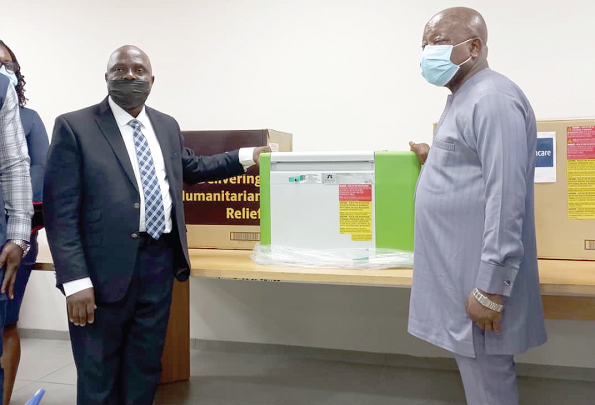The Ministry of Health has taken delivery of 16 ultra-negative cold chain pieces of equipment for vaccine storage.
A global shipping and logistics company, United Parcel Services (UPS), donated the equipment, commonly known as vaccine fridges, for distribution to the 16 regions as part of the company’s corporate social responsibility (CSR).
All vaccines, based on their characteristics, require certain strict storage and movement temperature known as cold chain requirements, right from the point of manufacturing right into the syringe for it to stay efficient, safe and potent.
Receiving the vaccine fridges in Accra yesterday, the Minister of Health, Mr Kwaku Agyeman-Manu, said the ultra-negative cold chain equipment would help the country to boost its capacity for vaccine storage and be able to procure and accept vaccines that required ultra-cold storage and movement temperatures.
“Unfortunately, any time we start looking for vaccines, signing vaccine agreements and placing orders, we only look for vaccine candidates that our cold chain system could support. We did not have much space for ultra-low temperature vaccines and, therefore, vaccines like Pfizer and Moderna were not options.
“We have been looking at AstraZeneca and Johnson & Johnson, which we only had capacity to store. But with these donations and the bigger ones that the government is buying, which will arrive by next week, we can make arrangements to buy more of the others that require ultra-cold storage temperature,” he said.
Widen cold chain capacity
Mr Agyeman-Manu added that with limited options for vaccines due to its storage capacity gaps coupled with the global shortage and the closure of borders by countries from where the AstraZeneca was being drawn, it had become critical to boost national storage capacity.
“And so there is the need for us to look around, build capacity to accommodate other vaccines at all levels of temperatures. We have made efforts as a government to purchase ultra-cold vaccine fridges, we have received offers for donation such as what UPS has given us,” he said.
The minister expressed gratitude to UPS for the gesture and other support in the past.
He said the country had received vaccine support from UPS over the period and that included the transportation of vaccines under the required cold chain to the national storage facilities.
Cold chain
Providing details on the vaccine cold chain, the Manager of the Expanded Programme on Immunisation (EPI), Dr Kwame Amponsa-Achiano, said the purpose of the vaccine cold chain was to maintain product quality from the time of manufacture until the point of administration.
It was to ensure that vaccines were stored and transported within World Health Organisation (WHO)-recommended temperature ranges.
He explained that vaccine was a biological product and if it got too hot or cold, the active ingredients could degrade and become less effective.
“So the vaccine cold chain is a global network of cold rooms, freezers, refrigerators, cold boxes, and carriers that keep vaccines at just the right temperature during each link on the long journey from the manufacturing line to the syringe,” Dr Amponsa-Achiano explained.
“Note that whether the vaccine requires cold chain at two degree Celsius to eight degrees Celsius; -20 or negative 70 +/-10 (UCC) degree Celsius, the level of preparedness and the country’s readiness will be critical in selecting and accepting any vaccine,” he added.
He said the equipment gave the country a mix of fridge and cold box combination, which could be stationary and mobile at the same time.
“We are expecting some Pfizer vaccines and these will be helpful,” he said.
UPS
The Manager, Africa Special Project of UPS, Mr Bassy Antwi, said the gesture was in line with an age-long UPS tradition of giving back to the communities in which it operated.
“It is the people that make the business to thrive and, therefore, we also in turn give back to them our widow’s mite in support of socio-economic and health development,” he said.
Mr Antwi added that the gesture and tradition had become even more critical in view of COVID-19 pandemic.
“We would keep supporting you to ensure the people of this country are safe and I know God will crown all our sacrifices and efforts with no further loss of lives,” he said.

